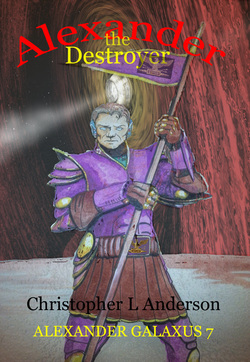 What is my next project? Space Cadet 3, Space Ranger 1, Veraxus? Unfortunately none of the above. For the next few weeks I'm working on interrogatories--yes interrogatories. For those of you unfortunate enough to have been forced into the legal system interrogatories are an exhaustive list of questions for a trial. We leased a horse out four years ago to a young lady for 4H. When she finished with 4H at the age of 18 the horse was supposed to come back to us so that our daughter could start to ride "Mommy's horse." You see Nicki was borne 24 years ago in our stable. He's been with us all his life. We leased him out to a girl in 4H so he could learn the routine of formal shows. He was a mountain horse, a hunter and a trail horse. Only one problem. When the lease was up the girl decided not to return Nicki. She felt entitled to him because she'd won some jumping competitions with him and now he should be hers. This would never have happened to my generation. We didn't feel entitled to anything. If someone loaned something to you; you returned it with thanks. The police told us to repossess the horse and so we did. Then the blank hit the fan. The girl and her 4H friends, even some of the adult 4H leaders, stormed our horse trailer while it was in motion and took Nicki off while my wife was boarding a ferry. She got his lead rope and Nicki stayed right next to Mommy, but the fracas kicked off a court battle. Now, instead of working on my next project I'm responding to legal questions as to why this poor little spoiled brat of a girl shouldn't keep Nicki just because she wants him soooo bad that no one else counts. Reminds me of Veruca Salt. Anyway, I hope to get back to more enjoyable things soon. One miracle at a time. In the meantime enjoy Alexander Galaxus 7: Destroyer and let me know where you want Alexander to go next
2 Comments
Just when you think you're done, yeah I can hear you now, 'Anderson, you've already delayed the release of Destroyer, changed the title, etc. What gives?
I haven't delayed it; not yet. Editing has it's own way of changing things. This isn't like a test where you go back and change the answer, then you change it back again. No, when I change things they are to add more interest to the story or smooth out the plot. For instance, when I had Alexander cruising Druze and talking about his mood shifts-something you the readers noticed-I had to have him doing something. Having dialogue alone creates what we call the "Talking Heads" and it drains the energy out of what you're trying to say. So  So what does Paris have to do with Alexander Galaxus? For those of you who keep up with my books you'll notice that I follow the examples of the founders of this craft, Heinlein, Van Vogt and Asimov; i.e. I weave real life into my science fiction in order to make it more real. Some have complained that they don't want any politics in their 'escape' oriented pastime and I sympathize as well as empathize with them. However, I would remind them that my heroes, my protagonists, always need an antagonist and that antagonist always, always needs a believable reason to behave the way he or she behaves. If they don't then the story is nothing more than a comic book. Yes I rail about socialism, communism, authoritarianism, etc.--true, guilty as charged. Why not? My main characters are all rugged individualists. Alexander doesn't wait for some federal program to whisk the Methuselans away in the depths of their bloated bureaucracy; no, he confronts them and takes care of the problem. That's what heroes and heroines do. My main characters are based off of people I admire. You've heard them quoted and lauded, even criticized, Lincoln, Churchill, Washington, Patton, Rommel--and yes--Alexander the Great. These were people who didn't wait for someone to do something for them but instead did something for themselves. Yes, I admire that. Besides, no one ever read a book about the hero who signed up for food stamps when he didn't need them. We all need a hand up sometimes--Alexander's bacon has been saved more than once--but eventually we all need to stand up on our own two feet. I'm in Paris today. I was in New York last week. The streets in Paris are equally as dirty as New York but in Paris there's an army of government laborers in fluorescent jumpsuits paid for by the national 75% tax rate. Yet the streets aren't any cleaner. What's worse in my mind is the Parisians don't seem to take any pride in cleaning up their city. It's almost as if they expect the government to do it; after all, they're paying enough in taxes aren't they? The laborers don't seem to get that. Why should they? If it's as hard to fire a federal worker in France as it is in the US (take the IRS for example) then they don't have to worry about it. So why do you think Alexander ends up dealing with these very issues that sap the strength out of our society? Hint. Read Heinlein. Read Van Vogt. Read Asimov. You'll see politics is the center of conflict in all of the giants of the craft. It has to be. It's the Human condition. Really, all the adventure aside, isn't that what these novels are about anyway? There are readers out there who have waited patiently for Alexander to wrap things up with the Methuselans for quite some time now--a year. That's a long time, I know, but this time I was certain I had a really good chance at hitting my April 15th deadline. I didn't. No excuses. Destroyer simply wasn't ready. It was done but not ready. I wasn't happy with it, my editor wasn't happy with it. I couldn't put my finger on it; it was just missing--something. So I let it sit for a few weeks and addressed some of the editor's major concerns. Of course that led me in different directions, good ones, don't get me wrong. With that reality Destroyer bloomed. The bottom line is simple: I'm not going to put out a book until its ready. I do care what my readers think of these works. If you're reading Destroyer then you've slogged through all of Alexander's adventures to do so. I will give you your money's worth. Destroyer caused me problems from the beginning and I'm not about to put it out to my readers in any format I am not satisfied with. Enigma and Destroyer will get done and they will worth the wa, you have my word on it. When a writer or an author says 'I'm done with my first draft," what does that mean? For each writer it means something different--sorry, that's the way it is. I just finished the first draft of Alexander the Destroyer, Volume 6 of the Alexander Galaxus series. It came in at a longer than expected 133,000 words or about 425 pages. Now the industry likes to see non-Tom Clancy novels run about 70,000-100,000 words. They don't like LOTR's type epics. I can understand that; the shorter the novel the more bang for the buck. I've been criticized by a few people that my novels are a 'quick read' but honestly I think that's because they don't put the book down. The shortest novel I've put out there is well above the minimum 70K so the critique is more wishful thinking than relevant. Still, Destroyer will end at whatever length the story demands. I thought it would be about 90K but I never really know where the book is going to lead.
I have one hard and fast rule for the first draft: write whatever comes to mind. The job of the first draft is to get the story on paper. The second draft is a time to fill in the blanks, make sure the story is cohesive, embellish those areas that need it and trim the areas that get too long or too slow. The second draft is also very timeline intensive. It involves double checking that Alexander really had time to get to the Druze Homeworld between making a pass at Nazeera on Pantrixnia and baiting Lahora on Methuselah. The second draft usually takes two to three weeks. The third draft doesn't take long, usually a week. Its to smooth out the novel and get it in shape for the editor. The editor then spends about two weeks working on grammar, identifying story problems and identifying slow areas. While the editor has it I work on something completely different. This gives me a fresh mind with which to come back and tackle the last phase. I run through the novel at least three more times checking on flow, tweaking scenes, and again checking timelines and character plots. It's a labor intensive process but one which I've developed to try and give you, the reader, a quality product. I take that part seriously. After all, I'm asking you to pay your hard earned money for this. These are quite properly considered 'pulp fiction' novels and are not intended for a Pulitzer prize but for escapist enjoyment, but I want to give you, strike that, sell you a world for you and me to enjoy. That demands a certain amount of professional diligence. I promise, I won't cut corners to get a novel out prematurely; an unpolished product will lessen your enjoyment and embarrass me. So for those of you waiting on Alexander be patient. He's nearly there. I think he'll be well worth the wait. I've recently added a new part of the website with a collection of my favorite scenes. Most of these include a short description of the scene to include what I like about it. The scenes are literally literary life experiences, snapshots of moments I like, dislike or simply can't forget. For me, some of these moments correspond to real experiences while others are simply serendipitous.
Every writer has their own methods. I heard Mary Higgins-Clark give a talk where she described how she story-boarded the entire novel before writing it. I'm on the other end of the spectrum, not for being lazy, but because every time I outline a book I end up deviating from that outline before I get done with the first page. My best writing comes from these unplanned excursions from the plot. Take my present project, Alexander Galaxus 6: Alexander the Destroyer as an example. Every novel begins with a direction or a loose idea of what might happen. Obviously, Destroyer is the final installment of the Methuselan Invasions Trilogy so it has to wrap everything up. Beyond that, I have to depend on clues from the previous books as well as my original ideas for how Alexander was going to win this 'suicidal' venture. That puts extra pressure on me to come up with something that works. I try to do it on the fly; spontaneous ideas come when I'm rolling on the story, that is, writing regularly with the story always in the back of my mind. I believe this spontaneity makes for a more entertaining novel. For one thing, that style allows me to discover twists and turns in the plot instead of manufacturing them after the fact. Again that makes it more entertaining for the reader-hopefully-and that's the ultimate purpose of the novel. My greatest strength as a novelist is certainly my imagination. Fortunately for me, that is also the reason I enjoy writing. For me writing a novel is like reading one; that is, I have no idea what's going to happen. I'm always interested to see how I'm going to get my protagonist out of the jam I've stuck him in. I approach such scenes with a certain amount of anxiety because I really have no idea how I'm going to solve the problem. I enjoy it; it remains only for you, the reader, to decide whether or not it works for you. Of course, the novel has to be grounded in something we're familiar with. That's why I fold present day politics and cultural debate into the fabric of my worlds. I have no interest in writing about something none of us, myself included, can relate to. That being said, not all the subjects we deal with today are pleasant ones. My last novel, the Flint Wolfe Thriller The Mahdi is a case in point. There are very contentious or controversial parts to the novel, especially concerning Flint's running battle with Islamists and their jihad against the West. Sure it's an unpleasant reality of our world but hey, it's real. I did take care in that novel, and in that series, to only ascribe acts to the Islamists that they had actually committed and I narrowed their plot-lines to what they had actually stated as their goals. Still, it's generated a lot of comments concerning the subject matter, even my 'conservatism,' of some of the plots or sub-plots going on in my novels. I have to tell you there is a reason behind it all; it's not to preach or lecture, it's to make the novel relevant to our lives. Why shouldn't my characters have to deal with the same problems you and I deal with? I'm certainly not going to give Alexander, Flint Wolfe or Tarion a free pass--that would make for a dull novel. So if you run into something you don't agree with, hey that's the real world creeping into the fantasy. If you're reading the novel for escapism then don't be too worried, these are novels; the hero always wins in the end. Merry Christmas everyone! I spent my vacation going through Galaxus IV in preparation for beginning Galaxus VI. Of course that means I have to go through Galaxus V as well. As I mentioned in my other section I took to heart some of the comment readers made concerning the politics of the books. It's not that I am ignoring the politics, but some readers thought it detracted from the story. As it wasn't my intention to make that the central theme of the book I ended up making a few changes. So you see, authors can and do listen.
It's also cause me to modify the process for how Galaxus VI is coming out. The target date is still April with a May release date; sorry, I'm not going to rush it. I will post teasers every few weeks though. I hope everyone had a great Holiday season. See you next year! For those of you who have been wondering where I've been and what's going on, here's something to chew on. In about two weeks I'll release To Kill Is Not Enough 12: The Mahdi. As the title implies Flint is up to his neck with the jihadists once again but this time they're not alone. The Mahdi covers the politics of the world from the White House to Tehran to Russia to China. The intriguing, and difficult, thing for me was that I didn't so much create the situation as I did put it together within the narrative of the book. You've seen nearly every event and heard many of the words already but instead of writing a dry book of political psychobabble I put it in Flint's final novel. I promise it will make you angry, scared, frustrated and suspicious--if you voted for Obama all those feelings will trend toward the author--me. That's fine. It's all about the adventure. I simply let today's forces loose in the playground of my imagination, throw in a few personal hangups and some contrary, competing women and hey--we have a new novel. Two weeks. Post your thoughts on my blog, good or bad, but if you're an ex-hippie or a current socialist don't expect understanding or mercy from either me or Flint!!
Divorce is a terrible time in anyone’s life but especially for children. It’s very easy to get wrapped up in your own pain as your life disintegrates and lose track of the real victims—your kids.
|
AboutChristopher L. Anderson is a husband and a proud father of two kids. With everything else he’s done in his life, being a rocket scientist–literally, a USAF Officer, B-52 Commander, Research Pilot, working for NASA, flying for the airlines, being active in the Church and during all that becoming an established Author, well, it all comes back to the basics, to the foundation of being a husband and a father. Archives
September 2013
Categories
All
|
| Thor's Grog Induced Tales |
|

 RSS Feed
RSS Feed